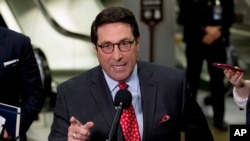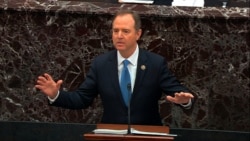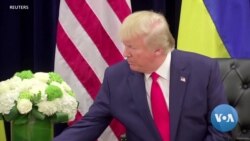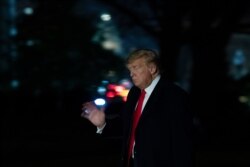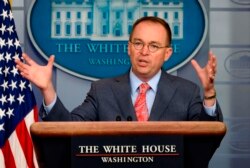President Donald Trump embarked on another twitter tirade against Democrats Thursday, accusing them of unfairness and corruption in their efforts at removing him from office.
As Trump rages against the ongoing Senate impeachment trial, the president’s legal team is planning to mount an aggressive defense, arguing he did not commit an impeachable crime and should be acquitted.
“The president has done absolutely nothing wrong, and that these articles of impeachment do not begin to approach the standard required by the Constitution,” Pat Cipollone, lead White House counsel, said during his opening statement Tuesday.
On Wednesday afternoon, House Democrats began laying out their opening arguments to the Senate, trying to convince senators that what the president did amounts to abuse of power, and that he must be removed from office.
“We are countries built on a commitment to our people, not unyielding loyalty to a president who would be king,” said Congressman Adam Schiff, lead House impeachment manager.
Cipollone and his team argue the Democrats’ impeachment charges against the president of abuse of power and obstruction of Congress is legally deficient and partisan.
Trump’s legal team is scheduled to begin opening arguments Saturday, after House Democrats have presented their case.
Early Wednesday the Senate agreed that each side would have 24 hours divided over three days to give their opening arguments.
WATCH: Trump Legal Team Mounts Aggressive Defense Against Impeachment
No crime, no impeachment
The president continues to insist that he committed no wrongdoing in his interaction with Ukrainian President Volodymyr Zelenskiy.
During a news conference at the World Economic Forum in Davos, Switzerland, earlier this week, Trump repeated his claim that he did not pressure the Ukrainian president to investigate the business dealings of Hunter Biden, the son of former Vice President Joe Biden, a leading Democratic presidential candidate, during Trump’s phone call with Zelenskiy last July. “
The president of Ukraine said it was “perfect,” Trump said.
While Zelenskiy initially said there was no discussion of a quid pro quo, in an interview with Time magazine last month, the Ukraine leader criticized Trump for blocking military aid to Ukraine.
President’s argument
Trump’s lawyers are echoing the president’s argument that he committed no impeachable crime in their legal defense.
“The president’s defense seems to depend upon this argument that, what I did was not a high crime and misdemeanor, and even if it was, it’s not sufficient to justify removing me from office,” said William McDaniel, senior counsel at the law firm Ballard Spahr. McDaniel represented some advisers to President Bill Clinton during Clinton’s impeachment, and has been closely following the Trump impeachment trial.
Constitutional scholars still debate what constitutes “high crimes and misdemeanors,” which is a basis for impeachment.
“It’s unwise to broaden the circle so that anything that you don’t like becomes a high crime,” said James Blumstein, a constitutional law professor at Vanderbilt University. On the other hand, Blumstein said defining high crimes and misdemeanors as an indictable offense may be too narrow.
“But that’s a matter of advocacy and what persuades the senators and eventually the people,” he said, noting the result of this trial will become legal precedent for future presidents.
Executive privilege
Trump’s counsel accuses Democrats of not providing evidence to support their claims. At the same time, they defend the president against the second article of impeachment — obstruction of Congress — by arguing that Trump was asserting executive privilege in blocking officials from testifying.
“In many ways, that’s as serious a charge as the first one, because it’s basically saying to Congress that you can’t investigate anything I do as president, because I won’t give you any information, no one will testify, you won’t be able to learn what happened,” McDaniel said.
He added that this is the first time in history that a president has not cooperated with an impeachment inquiry by refusing to provide documents and witnesses.
Additional witnesses
Next week, after both sides have delivered opening arguments, senators will have 12 hours to ask questions in writing.
The Senate will have another round of votes to consider whether to subpoena witnesses or documents.
Democrats are hoping for the votes of a handful of moderate Republicans who have signaled they may be open to hearing from more witnesses, including former National Security Adviser John Bolton and acting Chief of Staff Mick Mulvaney.
On Wednesday, Trump said that he was opposed to Bolton testifying because “it’s a national security problem.”
“What happens if he reveals what I think about a certain leader and it’s not very positive and I have to deal on behalf of the country?” Trump said.
Democrats believe Bolton’s testimony is crucial, as he is a firsthand witness to the president’s efforts to persuade Ukraine to investigate Biden and his son. Earlier this month, Bolton announced that he would be willing to testify, if subpoenaed, in the impeachment trial.




